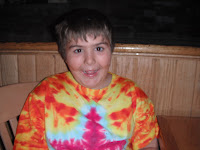Jen Alman writes:
The last four chapters of this week's reading seem to have been designed to inspire the reader to be the change they want to see in the world. The Zanders encourage the reader to create a spark and framework for that change and enroll others in that vision. It is not about manipulating people or situations to accomplish something, but using your passion to inspire others.
I also liked the chapters on being the board and telling the we story. It is so easy to blame others for what we perceive to be wrong. Instead the Zanders challenge the reader to take responsibility for what happens in your life and find a way to transform situations and see things in a different light. Doing this brings more compassion to a world full of human beings all trying to co-exist.
My response:
I agree that the last four chapters are meant to inspire us to go out and change the way we perceive the world. The message is simple, yet not always so easy to do. The idea of taking responsibility for everything, good and bad, that happens in our life is foreign to most of us. Yet the implications are boundless if we take the challenge. I am impressed that you were able to sum up a very complicated section of the book in so few words. Excellent job!






